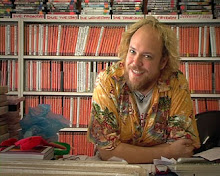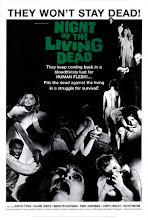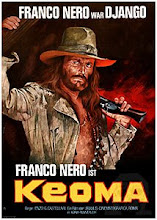 The Street Fighter’s Last Revenge
The Street Fighter’s Last Revengeaka Gyakushû! Satsujin Ken/”Revenge! The Killing Fist!”, Street Fighter Counterattacks
Director Teruo Ishii Writers Kôji Takada, Masahiro Shimura
Cast Sonny Chiba (Takuma Tsurugi/Terry Sugury), Reiko Ike (Aya Ôwada), Koji Wada (Kunigami), Frankie Black (Black), “Sue”/Etsuko Shihomi (Kahô)
 We finish our season of Street Fighter films tonight with the final in the series, The Street Fighter’s Last Revenge. Filmed in 1974 but not released in America until 1979, long after the martial arts craze had run its course, it still sees Sonny Chiba, the king of Japanese pulp cinema, in top form. The film is set as always against a sordid backdrop of modern Japanese crime and politics, which seem to be inextricably bound; both the yakuza crime lords and the corrupt district attorney are chasing a cassette tape containing the formula for synthetic heroin, and naturally fists-for-hire Terry Sugury (Sonny Chiba) gets the call from what looks like the inside of his Batcave. Like a seemingly endless game of ping pong he bounces between camps, playing one side against the other in a staggering variety of rubber masks - including Dracula. Sister Street Fighter Sue Shiomi is wasted (both figuratively and literally) in her throwaway role as a bad drug cop turned good drug cop, while the triple-crossing yakuza moll Terry DOES falls for (read: gives good lovin’ to), ends with disastrous consequences. Which proves that even an inhuman killing machine is human after all, eh Terry?
We finish our season of Street Fighter films tonight with the final in the series, The Street Fighter’s Last Revenge. Filmed in 1974 but not released in America until 1979, long after the martial arts craze had run its course, it still sees Sonny Chiba, the king of Japanese pulp cinema, in top form. The film is set as always against a sordid backdrop of modern Japanese crime and politics, which seem to be inextricably bound; both the yakuza crime lords and the corrupt district attorney are chasing a cassette tape containing the formula for synthetic heroin, and naturally fists-for-hire Terry Sugury (Sonny Chiba) gets the call from what looks like the inside of his Batcave. Like a seemingly endless game of ping pong he bounces between camps, playing one side against the other in a staggering variety of rubber masks - including Dracula. Sister Street Fighter Sue Shiomi is wasted (both figuratively and literally) in her throwaway role as a bad drug cop turned good drug cop, while the triple-crossing yakuza moll Terry DOES falls for (read: gives good lovin’ to), ends with disastrous consequences. Which proves that even an inhuman killing machine is human after all, eh Terry?
 After his micro-role in Sister Street Fighter, it’s good to see Chiba and his well-practiced sneer of disdain back in the driver’s seat, but by this point his character, not to mention the whole Street Fighter franchise, is teetering on the brink into silliness and self-parody. Towards the film’s end it regains some of the bloodshed and brutality of the first Street Fighter, but this is balanced with some comically camp and almost surreal villains, like Black (played appropriately enough by Frankie Black), a Mexican strongman in a mariachi outfit who shoots laser beams out of his sleeves. I’m not giving anything away here: Black’s demise in the funeral home is wonderfully grim AND out of its tree, and is a fitting end to a series that thrives on nastiness and gallows humour.
After his micro-role in Sister Street Fighter, it’s good to see Chiba and his well-practiced sneer of disdain back in the driver’s seat, but by this point his character, not to mention the whole Street Fighter franchise, is teetering on the brink into silliness and self-parody. Towards the film’s end it regains some of the bloodshed and brutality of the first Street Fighter, but this is balanced with some comically camp and almost surreal villains, like Black (played appropriately enough by Frankie Black), a Mexican strongman in a mariachi outfit who shoots laser beams out of his sleeves. I’m not giving anything away here: Black’s demise in the funeral home is wonderfully grim AND out of its tree, and is a fitting end to a series that thrives on nastiness and gallows humour.
 So put on a rubber face, fill the swimming pool with sake and sink your plastic fangs into the final in our Sonny Chiba festival, The Street Fighter’s Last Revenge.
So put on a rubber face, fill the swimming pool with sake and sink your plastic fangs into the final in our Sonny Chiba festival, The Street Fighter’s Last Revenge.
 The Good, The Bad And The Loser
The Good, The Bad And The Loser
Director/Writer “Kar S. Mak”/Karl Maka
Cast Lau “Ka”/Kar-Wing (The Good), Carter Wong (The Bad), Roy Chiao (The Ugly)
Straight kung fu films are usually an exercise in the absurd. When it’s deliberately played for laughs, the results are plain strange. And then there’s THIS film. Describing The Good The Bad And The Loser as a “broad” comedy is unkind - this elaborate martial arts parody on not just Sergio Leone but Western pop culture in general is a multi-layered free-for-all characterized by Carry On style smut, jarring anachronisms, silly voices, and a barrage of pigeon profanity (“Don’t give me that crap! Shit!”). Funny? As in “funny in the head”, perhaps. Needless to say, this is one of the greatest royal ripoffs I’ve had the pleasure of witnessing.
Kung fu movies were always Eastern noodle varieties of westerns, spaghetti or otherwise, and here popular comedian Kar Mak or “Karl Maka” (Aces Go Places series), directing and writing his first film, effortlessly transposes The Good The Bad And The Ugly to Dynastic China. The Bad is classic kung fu villain Carter Wong, he with the arched eyebrows and horse face, decked out in a cool black outfit and matching veil. He discovers a golden Buddha statue floating through the countryside with no discernible owner and, naturally, wants it for himself. So does The Loser, or comedian Roy Chiao in the obnoxious Eli Wallach role, a drunken libertine posing as a Buddhist monk who manages to take on an entire cathouse in a wine-smeared blur, and who is reluctantly tied to his occasional partner-in-crime The Good (Lau Kar-Wing, a Shaw Brothers regular often appearing in films directed by his more famous brother Lau Kar-Leung) who, once paid, always sees the job through. Sound familiar? And so begins the ever-shifting alliances between the titular anti-heroes as they head for the Golden Buddha temple and cemetery (no Boot Hill in
Generally acknowledged as the first real kung fu comedy, much of Kar Mak’s humour is reduced thanks to the atrocious dubbing to a series of frantic gestures and goofy visual gags. The ludicrous nature of the project, however, manages to save the day, and hell, I’m a perennial sucker for silly voices (who isn’t?). And seriously, where else will you hear finger harps plucking out Morricone’s musical punctuation while a village elder does a Marlon Brando impression in front of a vindictive dwarf in a wooden corset? I mean, seriously..





















































































No comments:
Post a Comment